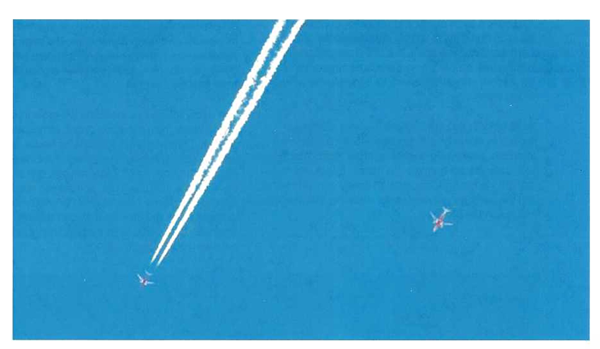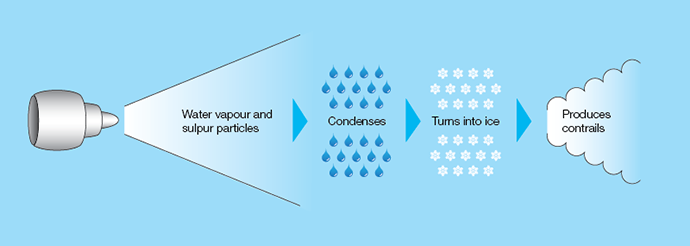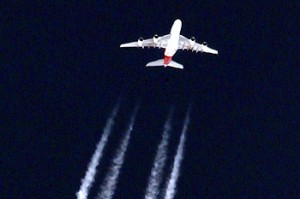Condensation trails or ‘contrails’ are white, cloud-like streams that are sometimes visible behind jet aircraft, normally when cruising at high altitude.
Jet aircraft emit a range of gases in flight, including water vapour and sulphur particles.
At the high altitudes at which jet aircraft cruise (normally above 26 000 feet or 8000m), the air is very cold. Cold air is less able to hold water vapour and therefore, if there is a large amount of water vapour in the air (high humidity), it rapidly condenses onto sulphur particles from the jet aircraft engine, turning into droplets of water. Water vapour from the aircraft engine also turns into droplets of water.
At high altitudes, the temperature is far below freezing and the water droplets quickly form ice particles, making up a white contrail. Contrails are harmless to health as they are made of ice. When conditions become drier (lower humidity levels), the ice particles evaporate.
The length of time a contrail lasts depends on atmospheric conditions. If humidity is low and there is only a small amount of water vapour in the air to turn into ice, the contrail will be short-lived. The ice particles that form quickly evaporate and mix into the surrounding atmosphere.
If the humidity is high (as is often the case in the east and north of Australia), the large amount of water vapour will easily condense onto the sulphur particles from the jet aircraft engine. The ice particles will continue to grow in size by taking more water from the surrounding atmosphere. These contrails can last for hours, extending long distances behind the aircraft.
Air turbulence, caused by winds or by other aircraft, can lead to contrails spreading out, sometimes reaching several kilometres in width and 200-400 metres in height. They can develop into extensive cirrus clouds that look the same as naturally occurring clouds.
Sometimes a jet aircraft leaving a persistent contrail will appear to be close to another that has no contrail. This normally happens when the aircraft are at different altitudes and the air around the higher aircraft has higher humidity than that around the lower aircraft.

Two aircraft on the same track, at different altitudes, one creating a condensation trail and the other not.
As air traffic continues to increase there is more opportunity for contrails to form, especially in areas of high humidity. However, international regulations minimise the emission of impurities from jet engines, so sulphur makes up less than 0.05% of jet fuel by weight. Improvements in engine efficiency are likely to reduce this even further so that in future, there may be fewer particles from jet aircraft engines to help form the ice that creates contrails.

